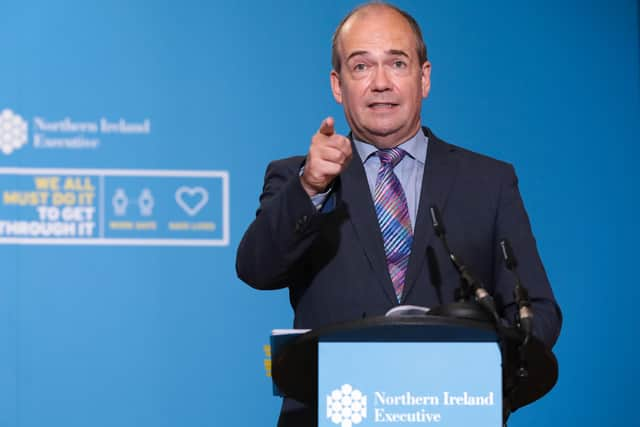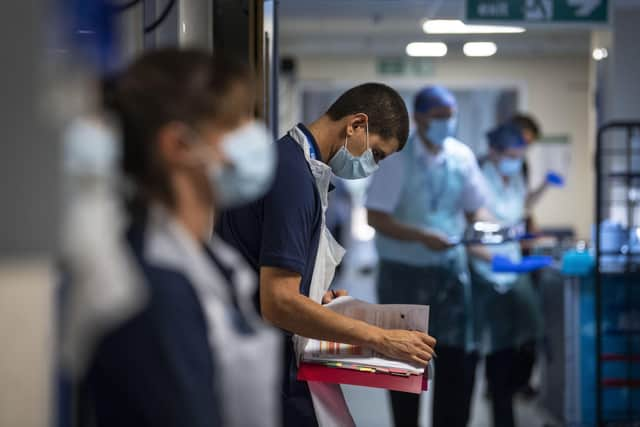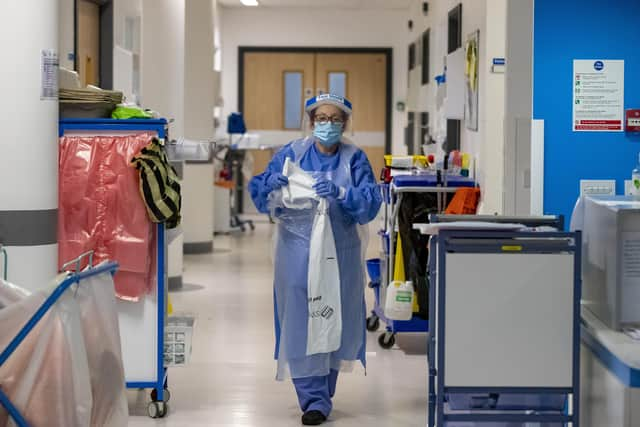NI to see consequences of Christmas decisions ‘this week and next’
and live on Freeview channel 276
Speaking on the BBC’s Stephen Nolan radio show, he said: “The unintended harm to people waiting for surgery is real.
“It is all about protecting the health service - people need to stay at home, reduce their contacts and assume that every time you meet someone they could be carrying covid.
“We all have our part to play here.”
Advertisement
Hide AdAdvertisement
Hide AdDr McBride added that “we are at a very serious moment, this is the most serious to date.
“Modelling suggests we are going to come under great pressure and will see increased numbers of people dying with covid,” he added.
“We always knew there would be a pay back (for Christmas), with mixing between generations and increased cases. We will probably now see a doubling of patients in hospitals with covid, and very likely numbers be in excess if 1000.
“Staff are exhausted and making difficult decisions.”


Dr McBride added that the health service “prioritise care on clinical priority” and that “respiratory support is for everyone, not just Covid patients”.
Advertisement
Hide AdAdvertisement
Hide AdHe added that “this week and next” the NI public will see the consequences of decisions people made at Christmas.
“Hospitals can cope with covid but it means stopping everything else,” he said. “That is the price we have to pay.”
Last night an emergency call yesterday went out to all off-duty staff at a Northern Ireland hospital last night, to return to work immediately.


Managers at the Western Trust tweeted the SOS message as hospitals reached breaking point.
Advertisement
Hide AdAdvertisement
Hide AdThe message said: “Attention all off-duty staff in the vicinity of SWAH. Due to increasing pressures this evening on the NI Healthcare System, we are appealing to you to contact or go directly to the hospital. Thank You”.
Dr Anne Kilgallen, chief executive of Western Trust, said: “This situation is more grave than it has ever been in the course of this pandemic. Our hospitals are facing into an abyss.
“At the moment one in four of the people in our hospitals have Covid-19. It’s about 700 people. At the peak of the first surge there were 400 people in hospital so already we’re in a very grave situation. The projections show this is likely to double by the third week of January.”


It is understood the call for assistance was made to staff to attended SWAH to help out colleagues in the Southern Health and Social Care Trust amongst others.
Advertisement
Hide AdAdvertisement
Hide AdChief Executive of the Southern HSCT, Shane Devlin, said Craigavon and Daisy Hill Hospitals were under immense pressure and added: “I just want to say a massive thank you to all of the staff who responded to our extremely difficult position today in Craigavon and Daisy Hill Hospitals. We are helping an unprecedented number patients and our team is under huge pressure.”
A short time later Northern Ireland’s six hospital chiefs issued a joint statement about the situation and warned it was so extreme that:
“In early December 2020 we issued what we described at the time as ‘a stark warning’ about huge pressures across the health and social care system in Northern Ireland.
“At that time we stressed that several of Northern Ireland’s acute hospitals were already operating beyond capacity. Within days, the pressure that the system was under was evident through the images shown across media outlets of multiple ambulances queuing outside Emergency Departments. We also highlighted that there was a very real risk that hospitals could be overwhelmed in the event of a further COVID-19 spike in January.
Advertisement
Hide AdAdvertisement
Hide Ad“Although different parts of the country are in different stages of the third COVID-19 surge, and individual hospitals are reflecting this, the situation is very serious with modelling projections indicating that in the third week in January we will be trying to contend with double the number of COVID positive patients compared to the current position today, when several hospitals already have record numbers of patients.
“This is not a simple matter of putting up more beds. We need the staff to care for the increased number of patients. Pre-existing staffing pressures and staff absence because of COVID, and other reasons, mean that those staff simply aren’t there.
“Already several Trusts are having to stand down all but the most urgent elective surgery, including some red-flag cancer surgery, to redeploy staff to meet the urgent and immediate needs of extremely ill patients, especially both COVID and non-COVID patients needing ICU care. These postponed operations will be rescheduled as soon as possible. We have established a regional approach to ensure that any available theatre capacity across Northern Ireland is allocated for those patients most in need of surgery, both during surge and as we come out of this surge. This may mean that patients will need to travel further for their surgery. Cancer services are seeking to maintain chemotherapy, radiotherapy and other non-surgical treatments and alternative treatments will be provided in the absence of surgical options.
“We know that we speak for all health and social care staff in assuring the public that we will do everything that we possibly can to deal with the situation that is unfolding. Our staff, although exhausted, will once more go above and beyond to do the best they can for as many people as possible, and we thank them for it. It will definitely not be easy and the care that we are able to provide will at times fall short of the high standards we normally deliver but we will do our very best. Desperately ill patients whether COVID or non-COVID will always be the ones being prioritised.
Advertisement
Hide AdAdvertisement
Hide Ad“No-one should be attending an Emergency Department at any time unless they need emergency care. It is likely that those who do attend will wait longer to be seen and for admission to hospital if that is what they require. Patients arriving by ambulance will also wait at times, sometimes for many hours before space is available in an already over-stretched ED. This has a direct impact on the ability of the Northern Ireland Ambulance Service to respond, in a timely manner, to life threatening emergencies in the community.
“Patients also need to leave hospital as soon as they are medically fit to leave. We will work tirelessly to ensure that this happens. That might mean accepting a placement where it is available and it might also mean families having to go the extra mile to provide temporary support for relatives. But we will need every bed that we have for those that are most in need.
“Pressure in one part of the health and social care system inevitably impacts on the other parts. For example, we might once again need families to be willing to fill unavoidable gaps in domiciliary care.
“Never has the phrase ‘all in it together’ been so pertinent and just so important. The COVID-19 vaccines provide the long-term hope and the current lockdown offers the opportunity to shorten the duration of the current surge. The public can play their part too by staying at home, practising social distancing and good hand hygiene and wearing face coverings.
“We thank you in advance for your assistance.”
Michael Bloomfield
Chief Executive
NIAS Trust
Shane Devlin
Chief Executive
Southern Health and Social Care Trust
Cathy Jack
Chief Executive
Belfast Health and Social Care Trust
Anne Kilgallen
Chief Executive
Western Health and Social Care Trust
Seamus McGoran
Chief Executive
South Eastern Health and Social Care Trust
Jennifer Welsh
Chief Executive
Northern Health and Social Care Trust “
_______________________________________________________
Advertisement
Hide AdAdvertisement
Hide AdA message from our editor: Thank you for reading this article. We’re more reliant on your support than ever as the shift in consumer habits brought about by Coronavirus impacts our advertisers.
Please consider purchasing a copy of the paper. You can also support trusted, fact-checked journalism by taking out a digital subscription of the News Letter.